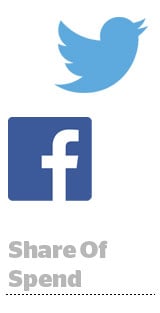 Here’s today’s AdExchanger.com news round-up… Want it by email? Sign-up here.
Here’s today’s AdExchanger.com news round-up… Want it by email? Sign-up here.
The Market Shift To Social
With Facebook’s developer conference F8 in full swing, eMarketer reports that the social platform and Twitter will take a 33% share of the US digital display market by 2017 (a projected total of $37.36 billion). The research firm predicts US display in 2015 will hit $27.05 billion, with Facebook’s US ad revenues projected at $6.82 billion and Twitter’s at $1.34 billion. “Both Facebook’s and Twitter’s gains in the digital display market are driven by mobile advertising,” reads the report. “For the first time in 2015, mobile will surpass desktop in display ad spending in the US, increasing from $9.65 billion in 2014 to $14.67 billion. Meanwhile, desktop display ad spend will decline in 2015, falling to $12.38 billion, from $12.56 billion last year.”
Kellogg’s Vexed By Viewability
Speaking at Advertising Week Europe in London, Kellogg’s associate media director Amaya Garbayo said viewability trumps fraud on the brand’s list of concerns. “Video is a lot more problematic than display when it comes to non-human traffic because there is more desirable inventory and the CPM is higher. There are tools on the marketplace to avoid some of that,” Garbayo said. “Non-human traffic may have been in the news lately and is very important but viewability is a lot larger for Kellogg’s.” The brand has recently prioritized programmatic through the creation of an in-house unit and a partnership with Yahoo’s video platform, BrightRoll. More via The Drum.
Publicis’ Takeover Plan
In the wake of its $3.7 billion Sapient takeover last November, Publicis boss Maurice Lévy spells out the holding company’s 2015 acquisition strategy. “We will spend much less than previous years and that’s clearly because we have made this [Sapient] acquisition in cash and we have to reduce our debt level, which we will do,” Lévy told Business Insider. “We are delivering close to $1 billion of free cash flow, which will help us a great deal. Acquisitions we will be doing will be limited to either some region of the world where we need to complete some of our network or in some specific capabilities in digital, or in analytics, or data.” Lévy was quick to throw Razorfish under the bus, claiming that without the impact of “difficulties” with Razorfish’s business, Publicis would have posted a 4% growth rate for 2014.
APAC For The Win
According to a forecasting report from Carat Global, digital ad spend in the Asia Pacific is poised to grow 20.1% this year, tops in the world. Carat further anticipates North America to spike by 16.4%. Latin America will also have similar growth at 16.2%. “Online Video has a 21.6% forecast for 2015, with growth partly driven by a shift of investment away from TV,” reports Marketing Interactive. “Expectations are particularly high for original content. In the US, nearly half (48%) of online video budgets will go to ’made for digital’ video.”
Targeted Audio Ads Play Ball
Beginning with the 2015 Major League Baseball season, Triton Digital will exclusively deliver and monetize streaming audio ads for MLB.com Gameday Audio desktop and the MLB.com At Bat mobile app. The partnership marks Gameday Audio’s first foray into targeted audio ads. “Baseball fans are passionate, engaged, and devote a lot of time to listening to their favorite teams’ games,” said John Rosso, Triton Digital’s president of market development. “This partnership enables advertisers to deliver targeted and on-message ads to a highly qualified and sought-after, live audience.” Read the release.
New Sales Platform
Following George John’s exit as Rocket Fuel CEO, Lotame CEO Andy Monfried sheds some light on the shift from selling managed services to platforms. He argues that the business of selling platforms versus managed serves differs because the former requires “more nuanced positioning and go-to-market strategies.” He presents six core pillars to the sale of platforms, such as avoiding random data points and ensuring one has numerous referenceable clients. “It’s ok for a buyer to ask these questions and it’s a must for a seller to be able to articulate their position against them,” he writes. “As an industry we certainly don’t need more acronyms, but what every company who is selling a platform does need is a hard and fast set of standards that represent their core values and mission.”
But Wait, There’s More!
- DoubleVerify Hires AJ Kintner to Lead Programmatic & Platform Sales
- Doing is Believing – Doug Weaver on The Drift
- Programmatic Is 30% Of Ad Sales For IBT Media – Folio
- Nielsen And Rocket Fuel Partner on INDYCAR Campaign – Racer
- Maxifier and Moat Partner on Attention Metrics and Viewability – press release
- ESPN Picks Outbrain In Multi-Year, Global Deal – AdWeek
- The Biggest Programmatic Challenge – iMediaConnection
- Index Exchange Announces Integration With Adobe Media Optimizer – press release
- Mediaocean And Videology Partner For TV And Video Ad Buying – press release
- European Native Ad Tech Platform Adyoulike Posts $10M Turnover – press release
- Better Attribution, Tracking Needed To Boost Mobile Paid-Search Spending, Campaigns – MediaPost
- Twitter Launches Periscope, Its Live Video Streaming Meerkat Competitor – The Next Web











